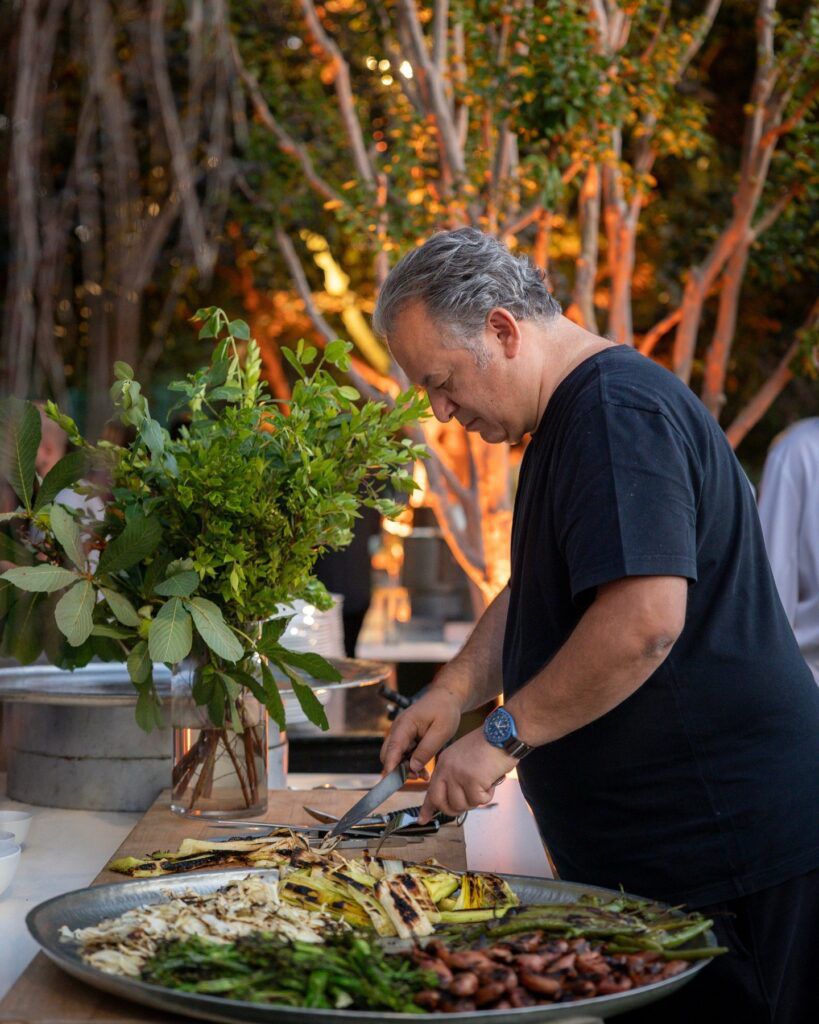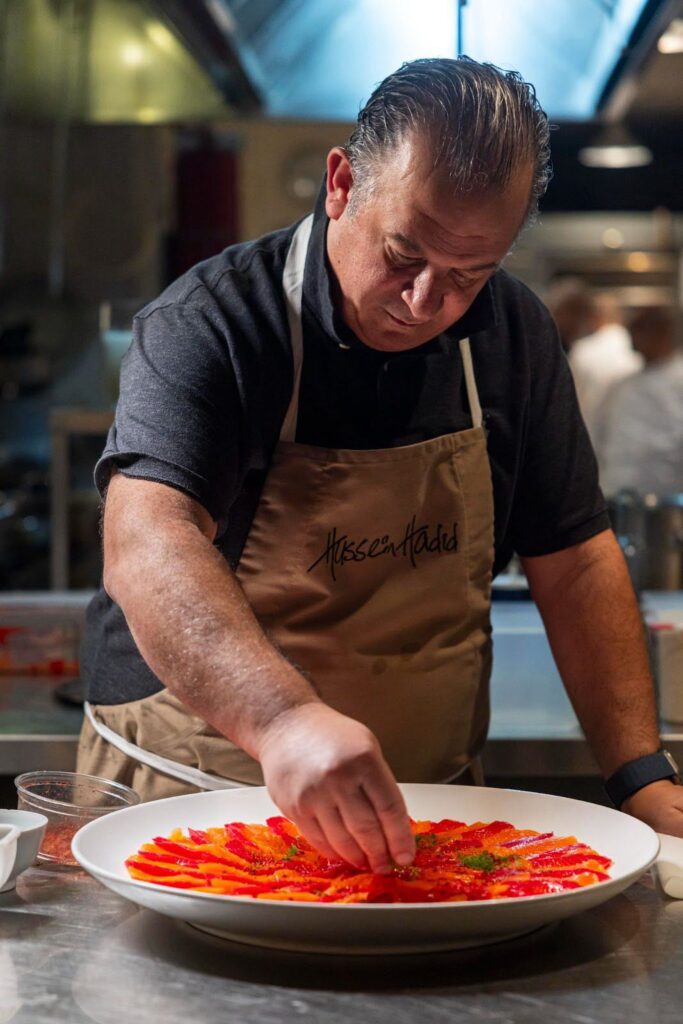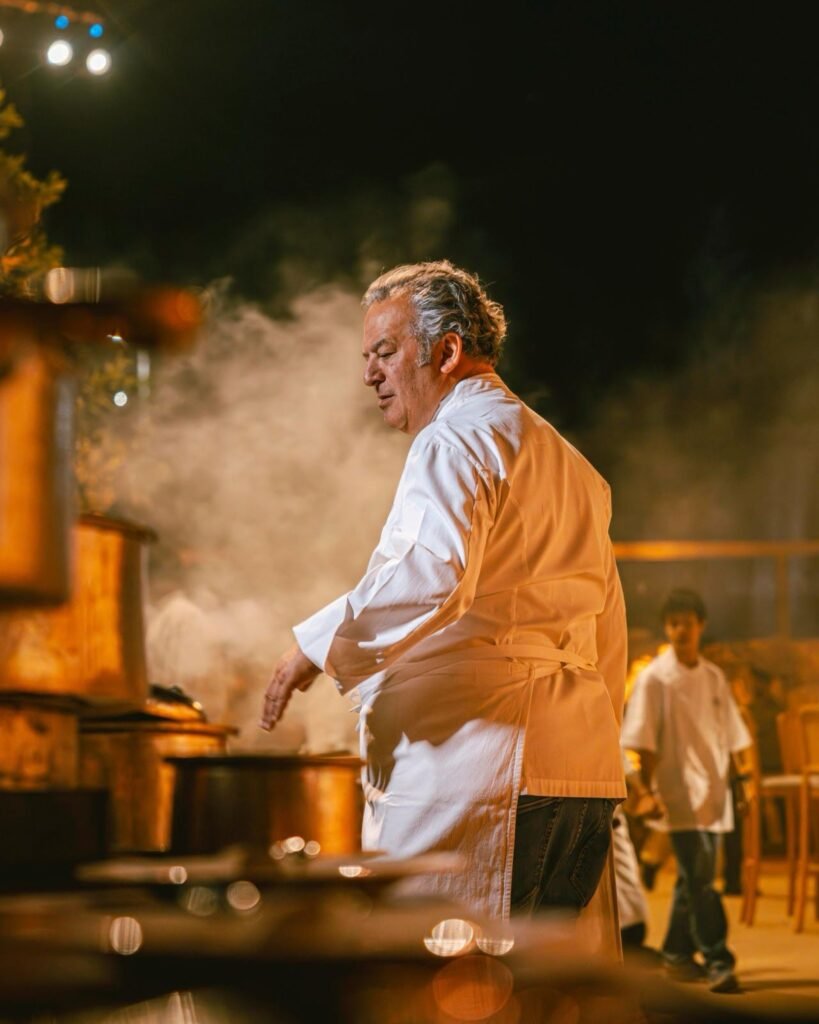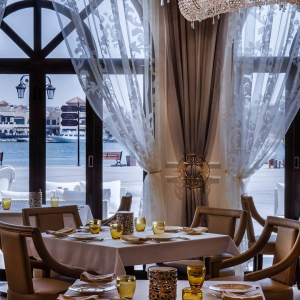Hussein Hadid is not just a chef. He is a storyteller, a mentor, a dreamer, and above all, a believer in the power of food to connect cultures and heal communities. His journey began with one unforgettable dish he tried as a teenager while traveling abroad, an experience that changed the way he saw food forever.
Since then, he has cooked in New York, collaborated with Michelin star chefs across Europe, and brought Lebanese flavors to Geneva. Yet, despite his international success, his heart has always been rooted in Beirut. Today, Hussein continues to create culinary spaces that celebrate culture, resilience, and the human spirit.
A Taste That Changed His Destiny
As a young traveler, Hussein once tasted a dish that completely shifted his perspective. It wasn’t just about the flavor; it was the realization that food is a vessel of history, identity, and creativity. From that moment on, he knew he wanted to explore the world through cooking.

What fascinates him today isn’t only the food itself, but the process, the rhythm of chopping, the sizzle of browning, the sound of blenders and food processors working in harmony. For him, every tool in the kitchen tells a story. His personal passion lies in collecting chef’s knives from around the world, each blade carrying a history, just like every plate he serves.
Building People, Not Just Plates
One of Hussein’s proudest achievements is the team he has built from scratch. Many of his team members started without any culinary background. Through patience and guidance, he transformed them into skilled professionals he can now rely on in the busiest of kitchens.

He also recalls training a French chef who had never cooked Lebanese food before. Step by step, he mentored him into becoming the head chef of Balila in Geneva. But Hussein didn’t stop at teaching recipes, he brought him to Lebanon, letting him taste the culture, absorb the traditions, and understand how Lebanese people interact with food. It was mentorship rooted in experience, not just instruction.
For Hussein, cooking is never just about feeding people. It is about mentorship, growth, and creating a sense of community.

Global Journey, Local Roots
Hussein’s formal journey began over 30 years ago when he trained at the French Culinary Institute in New York. He went on to work at the acclaimed San Domenico and earned recognition from The New York Times with a three star review, an achievement few chefs ever experience.
His career also brought him to Europe, where he collaborated with culinary giants like Marc Veyrat, Stéphanie Le Quellec, and José Avillez. Each kitchen, each culture, and each challenge deepened his understanding of food and people.
Yet, despite such opportunities abroad, Hussein always returned to Beirut. The city, resilient, complicated, and beautiful, was home. Even as Lebanon faced economic collapse, social instability, and war, he chose not to leave. “This country shaped me,” he often says. “It deserves more than abandonment, it deserves rebuilding.”
Pavilion Café A Space of Culture and Calm
Among Hussein’s latest projects is Pavilion Café, located between the historic National Museum of Beirut and the iconic Hippodrome. The café sits inside the Nuhad Es Said Pavilion for Culture, making it more than just a place for breakfast or lunch, it is a cultural mission.
Hussein created a fresh, light, and comforting menu perfect for business lunches, coffee breaks, and cultural gatherings. The setting feels calm yet refined, a daily escape from the city’s chaos.
Most importantly, Pavilion Café supports a bigger cause. Proceeds directly contribute to the preservation and sustainability of the National Museum. For Hussein, this connection between food and heritage is what makes the project meaningful. Every coffee, every meal becomes part of a shared cultural effort.
Le Zed Wine Bar Elevating Beirut’s Social Spirit
Another of Hussein’s standout ventures is Le Zed Wine Bar in Ashrafieh. Unlike a traditional wine bar, Le Zed is designed as a lively social space where wine and food work together to spark connection.
The menu is built around carefully crafted small plates that elevate the flavors of an impressive collection of over 300 wines. But beyond the drinks and dishes, Le Zed has become a symbol of Beirut’s resilience. It offers a space of joy, warmth, and sophistication in a city that deeply craves social connection and light hearted moments. For Hussein, Le Zed is not just a consultancy project, it is a love letter to Beirut. It represents his dedication to building spaces where people feel welcome, valued, and inspired.
Balila in Geneva Sharing Lebanon with the World
Hussein’s vision has also travelled abroad. In Geneva, he helped shape Balila, a restaurant that blends Lebanese flavors with a modern dining experience. The restaurant has become a place where Lebanese heritage meets European hospitality, attracting locals and travelers alike.
At Balila, it isn’t only about serving mezze or traditional recipes, it is about storytelling. Every dish carries the soul of Lebanon, reminding guests that food can be both a memory and a bridge between cultures.

Philosophy of a Chef
Over the years, Hussein’s philosophy has crystallized around four pillars: passion, knowledge, hard work, and belief.
Passion brings emotion into cooking. A dish cooked with love is always remembered.
Knowledge ensures depth and authenticity. It empowers chefs to experiment with confidence.
Hard work lays the foundation for consistency and resilience in tough times.
.
Belief, whether in people, in projects, or in cities, fuels the courage to keep building even when circumstances are harsh.
He often says he wants to be remembered not just as a chef, but as someone who “chose depth over noise.” Someone who stayed when it was easier to leave. Someone who created spaces that told stories and inspired future generations.
Lessons for His Younger Self
If Hussein could speak to his younger self, his advice would be simple yet profound:
Be patient. Trust the process; growth takes time.
Don’t chase perfection too early. Focus instead on consistency and resilience.
Value people. The food matters, but the team you build and the energy you bring into the kitchen matter even more.
Stay rooted in your craft. Trends will come and go, economies will rise and fall, but your relationship with your craft is the one constant you can rely on.
Go deep, not wide. You don’t need to be everywhere, you just need to be meaningful somewhere.
A Life Rooted in Beirut
Lebanon has faced some of its darkest chapters in recent years. Many have chosen to leave, but Hussein has remained. His decision isn’t just personal, it is symbolic. By investing in Beirut’s culinary culture, he is proving that excellence and resilience can coexist, even in adversity.
His projects, Pavilion Café, Le Zed Wine Bar, and Balila, are more than businesses. They are acts of defiance, hope, and cultural preservation. Through them, he is contributing not just to Lebanon’s food scene, but to its social and cultural fabric.
Conclusion
Hussein Hadid’s journey is one of passion and persistence. From a teenager inspired by a single dish to a chef who has trained under masters, built loyal teams, and created culinary landmarks, his life story is both inspiring and instructive.
Through his projects in Beirut and abroad, Hussein demonstrates that food is more than sustenance. It is history, identity, and a form of storytelling. It is mentorship, resilience, and a way of building bridges between cultures.
His legacy will not be measured only in recipes but in the people he mentored, the cultural spaces he created, and the hope he nurtured in a city that refuses to give up. Hussein Hadid is more than a chef. He is a cultural guardian, a mentor, and above all, a believer in the power of food to shape a better tomorrow.
Do follow him on Instagram
Read More: Nobu Dubai Arrives in Mumbai: Supa San’s Unforgettable Culinary Experience












